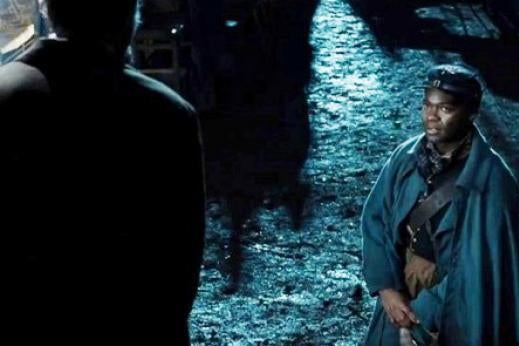Here at Brow Beat we’ve considered Lincoln from several historical angles. How accurate is the film? (Quite accurate.) What does it say about Mary Todd Lincoln? (She’s been unfairly maligned.) Does it consider questions about Lincoln’s sexuality? (Maybe.)
But there are larger and thornier questions to ask when it comes to how history is presented on screen. Since the film’s release last month, a debate has been roiling about Lincoln’s treatment of black characters. It’s not a matter of racist caricature; viewers generally agree that the main historical figures in question, White House servants Elizabeth Keckley and William Slade, are inoffensively drawn, if not fully realized. But their shallowness is precisely the point: According to critics like Ta-Nehisi Coates at The Atlantic, historian Kate Masur in the New York Times, and others, Lincoln does both history and its own audience a disservice by consigning black people to the role of passive observers of their own liberation—an outdated view of how emancipation was accomplished.
Underlying this controversy is a basic disagreement regarding what the film is actually about. While the historical agency of people of color and issues of representation are enormously important subjects, Lincoln never aims to address them. It is something lowlier: a kind of political tick-tock—a gritty, corruption-ridden, blow-by-blow vision of what it took to get a piece of legislation as important and controversial as the 13th Amendment through the House in 1865. (Much of the movie’s contemporary resonance has to do with the difficulty of that process today.) It’s on this level—as a procedural—that the movie works. In contrast, the movie’s more didactic and majestic moments feel cloying, overwrought, and even Disney-fied. For the most part, Spielberg and Kushner chose to make a film about political maneuvering, and they succeeded wildly. It’s only when, as Kate Masur helpfully points out in The Atlantic, “we understand the movie as one that’s about the abolition of slavery and the quest for civil rights,” that it becomes “less satisfying.”
In fairness to its critics, the film itself is partly responsible for this misunderstanding. Indeed, I suspect that the dissatisfaction Masur, Coates, and others have described stems partly from small gestures Spielberg apparently couldn’t help himself from making, which point toward a different film—one that might have done justice to black political self-advocacy and the abolition movement more generally. Consider, for example, the moving but ultimately gratuitous and historically fantastic recitation of the Gettysburg Address by a pair of soldiers (one black and one white) at the beginning of the film. Or the movie’s ending: Rather than cut to credits when Lincoln learns, from the church bells of Washington, that his crucial legislation has been passed, we see a probably apocryphal exchange between Thaddeus Stevens and the black housekeeper who may have been his mistress, then a maudlin depiction of Lincoln’s assassination. These unnecessary additions hint at a much more expansive narrative than the one the movie tells.
Actually doing justice to that grand narrative, however, would have required a multi-volume, Ken Burns-style documentary, rather than a work of popular entertainment. Historian Eric Foner, a vocal critic of Lincoln, succinctly explains what such a movie would have to address: “Emancipation—like all far-reaching political change—resulted from events at all levels of society, including the efforts of social movements to change public sentiment and of slaves themselves to acquire freedom.” That sounds like a fascinating and worthy monograph (or three), but would surely make a god-awful movie. A few critics have countered, somewhat convincingly, that a writer/director team as talented as Kushner and Spielberg could have found a way to flesh out the larger story. And I’ve no doubt that they could have—if they had wanted to make a movie about abolition. But it seems strange to me judge a film against a set of criteria that its makers never intended to satisfy.
